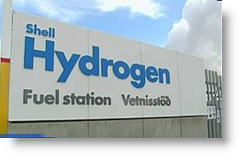Publication Date:14-May-2006
08:00 AM US Eastern Timezone
Source:Jon Frankel-MSNBC
 Reykjavik,
Iceland - Imagine an entire nation dependent on something other than oil for
its energy. It's cheap. There's plenty of it. And it means never worrying
about instability half a world away.
Reykjavik,
Iceland - Imagine an entire nation dependent on something other than oil for
its energy. It's cheap. There's plenty of it. And it means never worrying
about instability half a world away.
But to find it, you have to go to Iceland a country better known for its glaciers and booming fishing industry than leading the world in energy.
Here, it's all about hydrogen and geothermal technology.
Bragi Arnason, also known as Professor Hydrogen, has been working for decades on methods to harness and conventionally use hydrogen throughout Iceland, and eventually the entire world.
Oil is about one-third of the total energy consumption of the world, so we have to increase the harnessing of the renewable energy sources, Arnason said.
And his research is only the beginning of Iceland's quest to rid itself of fossil fuels.
Now, hydropower using water and geothermal plants provide all of the electricity, heat and hot water for the entire nation.
A lot of western countries envy Iceland for their renewable energy we have we can actually run the whole power system on hydro and geothermal its emission free, and its renewable, said Thorsteinn Hilmarsson of the Landsvirkjun Power Co.
We've been utilizing our geothermal resources for decades now, and we know it works its renewable, you can utilize it for decades or hundreds of years and it comes from the heat down below our feet, added Arni Magnusson from the Glitnir Bank Energy Sector.
Over half of Reykjavik's population gets its energy from the Nesjavellir geothermal plant.
This is where geothermal water is drilled, processed and then sent off in pipes all the way to the capital city. And it's not pollution spewing out into the atmosphere it's pure steam.
And even the commuters are using hydrogen.
We produce hydrogen, we pump it into vehicles and the only pollution coming from this is pure water, said Jon Bjorn Skulason of GM Icelandic New Energy.
That's right. No fumes at all.
Reykjavik currently has three hydrogen buses, and plans for more, and eventually passenger cars.
Experts say this hydrogen is safe with no danger of explosion.
But living on the cutting edge of technology has its costs literally. Hydrogen buses generally cost about four times more than normal diesel buses and passenger cars are averaging more than $150,000 each.
So how soon until consumers are actually able to afford it?
People are asking when it will be a reality, and it will take some more time, Skulason said. I think it will be about 10-to-15 years ahead.
While everyone from General Motors to Honda are working on cheaper hydrogen cars, many are banking on a real business in exporting Iceland's natural hydropower and geothermal energy to Europe and perhaps to the United States.
Until then, as oil prices keep rising,
businesses and governments around the world are looking to this tiny nation
to help power the future.